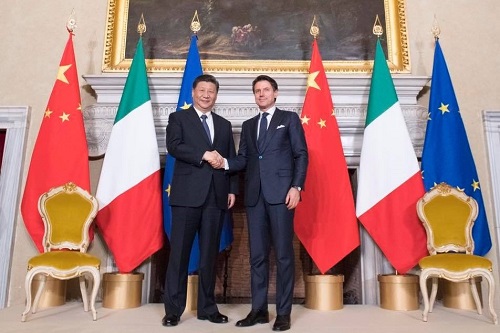FB photo
By
Flavia Di Mauro
The memorandum: a bitter internal reaction
Xi Jinping’s visit to Italy in late March resulted in the signing of a Memorandum of Understanding between China and Italy: a roaring success for the Chinese President, but a little less for Conte. The memorandum formalises Italy’s long-time announced intention to take part in China’s belt road initiative, making of it the first G7 country (even though not the first EU country) to join it. Ever since Undersecretary of State at the Italian Ministry of Economic Development Michele Geraci announced the imminent signing of the document in early March, a huge wave of criticisms hit the government. Surprisingly enough, some of the stiffer criticism came from within, with basically any party but the 5 Star Movement manifesting their skepticism over the manoeuvre. The newly elected Democratic Party secretary Nicola Zingaretti described the memorandum as “the umpteenth mess of this majority”[1] and his fellow deputy Rosato dismissed it as completely useless. Even though in milder tones, Matteo Salvini himself welcomed the announcement with a certain degree of skepticism, declaring that “if it’s a matter of helping Italian companies to invest abroad we are willing to talk to anyone, if it’s a question of colonising Italy and its firms by foreign powers, no,” he said, adding that this was “the position of the whole League”[2].
The new course of Italo-China relations
At first sight, these statements appear somehow paradoxical. Italy’s intention to take part in the BRI was no secret and it was not really a surprise to anyone, having been announced long ago by the same Party which now so severely dismissed it. Over the last five years, Italy’s relations with China have undergone a period of intense growth and renovation, marked by a strengthening of Italy’s diplomatic representation in China and an impressive number of visits and institutional events. In 2015, during one of these visits, former President of the Senate and Democratic Party Senator Pietro Grasso proudly declared that “Italy is ready to become the Western terminal of the New Silk Road, to build together with China the ideal and physical bridge that will connect Europe and Asia in this millennium”[3]. Later on, in 2017, it was former Prime Minister Gentiloni to endorse the project. While taking part in the Belt and Road Forum in Bejing, Gentiloni emphasised Italy’s enthusiasm towards the BRI. Italy, said Gentiloni “can be a protagonist in this grand operation China cares so much about: it is a great occasion for us and my presence here signals how important we consider it”[4]. Given such an open, transparent effort at sending such signal, how come that now the policy begins to bear its fruit nobody seems to be satisfied?
The two faces of Italy’s China policy
There is no need to say it: politics is a dialectic game. Yet, such a sudden skepticism on a multibillionaire project such as the BRI can hardly be explained as the consequence of the DP being now at the opposition. The roots for these ambiguities are indeed to be found in the very nature of the Italian policies towards China. Over the last few years, these policies have taken two opposite and yet complementary directions. On the one hand, Italy has been energetically cultivating the partnership with China in bilateral relations, fondly accepting its courtship. On the other, it has been pushing for a stronger control of the Chinese presence in Europe within the EU. In 2017, Italy was one of the three countries which proposed the creation of a mechanisms of enquire of foreign investments in Europe, which was clearly targeted at China. Over the years, Italy has also energetically fought to get more efficient anti-dumping policies, and it gave a significant contribution to the definition of criteria to identify market distortions[5]. These two approaches are not necessarily in contradiction: Italy is not in a strong position for negotiating with the Chinese giant, and it is only within the European framework that it can get the best out of this partnership. But is the new government following the same strategy? Apparently, it is not. Just a couple of weeks before the memorandum was signed, Italy abstained from supporting the European Union’s consolidated position on Chinese investments and Huawei[6]. Such a move gave all good reasons for Europe to raise its concerns over Italy’s intentions and the perfect pretext for the opposition to argue against an achievement they had been so strongly advocating for. Accordingly, in a TV interview, former DP Minister of Justice Andrea Orlando pointed out that while the operation could be beneficial, the risks had to be mitigated through preferring EU-China dialogue to bilateral interlocutions.
BRI: get it while you can?
While Italy really is not strong enough to take the best out of negotiations with China without European support, there are even those who believe that, was Italy to wait for Europe’s help, it would get nothing at all. In an interview to the Italian newspaper Sole 24 Ore, Administrator of Ligurian Sea Port System Paolo Signorini expressed his suspicion that Europe’s opposition to the BRI might hide the will by EU’s strongest economies to “dictate, once again, their political line”. “The BRI” continues Signorini “seems to be set in a way which would make Southern European countries the receptacles for China into the EU. And a part of Europe is opposing just that.”[7] As a matter of fact, the wound of Southern European countries over the EU’s managing of Nord Stream II is still burning. Nord Stream II has caused friction between Northern and Southern EU states, as it followed the Commission’s conclusion that South Stream, a Russian gas pipeline to south-east Europe, didn’t meet “third package” criteria, costing Southern European countries significant losses of future income. In this view, Italy, Bulgaria, and Hungary are still seeking an answer as for why South Stream was not possible and Nord Stream was[8]. It should not come as a surprise then, that faced with such a pervasive criticism over the memorandum, 5S Undersecretary at the Ministry of European Affairs Manlio Di Stefano responded that Italy “is not submitting anymore”. In 2016, it was Grasso himself to point out that “we must strike while the iron’s hot”, as Italy runs the risk to remain at the margins of Euro-China trade relations. Clearly enough, in order to elaborate a consistent China strategy, Italy must first clear its mind about what to expect from Europe. But what will it take for the EU to gain back Italy’s trust?
This article was originally published by the RIAC and is reproduced with their kind permission
Flavia Di Mauro
Flavia Di Mauro is a master student of world politics at MGIMO university



No Comments Yet!
You can be first to comment this post!